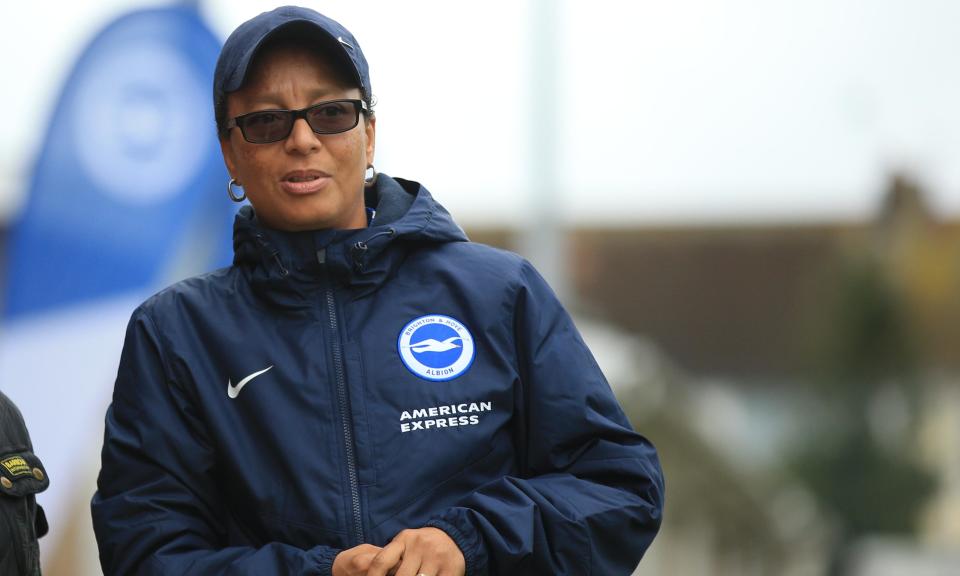Brighton at forefront of FA plan to revolutionise English women’s football
Brighton will be at the forefront of the Football Association’s bold plans to revolutionise women’s club football in England after their application to join next season’s fully professional Super League division one was accepted.
They will become one of 10 all-professional sides in the top tier of the domestic female game, with up to four more places available for teams when the second round of licence applications open in March.
Although currently in WSL 2, Brighton’s ambition was emphasised by their recruitment of Hope Powell, the former England manager, last summer. With promotion and relegation suspended for one season only at the end of the 2017-18 campaign, the FA’s restructure of the top two tiers in has now offered Powell’s side a fast-track route into the top flight.
Paul Barber, Brighton’s chief executive, was delighted. “We have always wanted to achieve equal status for women’s and girls’ football at the club, and acquiring Tier One status will now enable us to make this a reality,” he said.
READ MORE: Southgate: Exciting Alli and England creators can hurt Belgium
READ MORE: Giroud insists England are afraid of France
Powell was equally thrilled. “I am overjoyed,” she said. “This will allow the club to realise its aim of playing at the very highest level.”
The other nine sides to have been awarded top tier licences are Arsenal, Birmingham City, Bristol City, Chelsea Ladies, Everton Ladies, Liverpool Ladies, Manchester City, Reading Women and Yeovil Town. Current members of WSL 1, all saw their applications rubber-stamped but Sunderland, currently in the top flight, opted not to enter the bidding process.
Teams hoping to operate in WSL 1 had to meet certain criteria including the establishment of youth academies. Those who did not want, or were unable to be run along fully professional lines, were invited to apply for places in the semi-professional WSL 2.
Tottenham Hotspur are one of seven teams have been accepted into the second tier – the others are Aston Villa, Doncaster Rovers Belles, Durham, London Bees, Millwall Lionesses, and Sheffield FC Ladies – with up to five more places available in March. Sunderland will reconsider their position in March when they hope to join forces with another team and submit a collaborative bid for a WSL 1 slot. If not they are expected to apply for a WSL 2 place.
Considering that a nucleus of the current England team – including Steph Houghton, Jill Scott, Lucy Bronze and Jordan Nobbs – all began their careers at Sunderland, the club’s decision has provoked disappointment in the north-east.
The FA hopes that the next generation of England internationals will benefit from the new fully professional WSL, with the idea part of the blueprint of the FA’s head of women’s football Baroness Sue Campbell, to make the national side the best in the world.
Uefa’s latest coefficients have shown that England’s progress under Mark Sampson – (sacked for non-football reasons in September) – over the past few years has elevated the Lionesses to No1 in the European rankings. The FA is scheduled to name Sampson’s successor by the weekend, with John Herdman, the Canada coach, believed to be a contender.
Watford and Oxford United, both now in WSL 2, have also chosen, controversially, not to apply to play in either of the top two domestic divisions but Oxford may reconsider in March.
Doncaster are top of WSL 2 and might have been expected to apply for a top-tier licence but decided against it after deeming the costs to be beyond their budget.
In contrast Yeovil, presently bottom of WSL 1, are delighted after a nervous wait to see if the FA would accept their application in the wake of a struggle to raise the necessary funds. Trevor Jenkins, Yeovil’s general manager, said: “It’s huge news. We couldn’t be more happy. We have had a bit of adversity to get over and had to work really hard to pull this application together, so it’s terrific.”

 Yahoo Sport
Yahoo Sport 








































